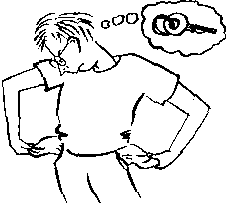|
7 Unit |
Present perfect (1) (I have done)
Study this example situation:

Tom is looking for his key. He can't find it. He has lost his key.
'He has lost his key' = He lost it and he still hasn't got it. Have/has lost is the present perfect simple:
I/we/they/you have (=I have etc.)
He/she/it has (=hes etc.)
The present perfect simple is have/has + past participle. The past participle often ends in -ed (finished/decided etc.), but many important verbs are irregular (lost/done/been/written etc.). For a list of irregular verbs, see Appendix 1.
When we use the present perfect there is always a connection with now. The action in the past has a result now:
'Where's your key?' 'I don't know. I've lost it.' (I haven't got it now}
He told me his name but I've forgotten it. (I can't remember it now)
'Is Sally here?' 'No, she's gone out.' (she is out now)
I can't find my bag. Have you seen it? (do you know where it is now!)
We often use the present perfect to give new information or to announce a recent happening:
Ow! I've cut my finger.
The road is closed. There's been (= there has been) an accident.
(from the news) The police have arrested two men in connection with the robbery.
You can use the present perfect with just, already and yet:
Just = 'a short time ago':
'Would you like something to eat?' 'No, thanks. I've just had lunch.'
Hello. Have you just arrived?
We use already to say that something happened sooner than expected (see also Unit HOD):
'Don't forget to post the letter, will you?' 'I've already posted it.'
'What time is Mark leaving?' 'He's already gone.'
Yet = 'until now' and shows that the speaker is expecting something to happen. Use yet only in questions and negative sentences
Has it stopped raining yet?
I've written the letter but I haven't posted it yet.
Note the difference between gone (to) and been (to):
Jim is away on holiday. He has gone to Spain. (= he is there now or on his way there)
Jane is back home from holiday now. She has been to Italy. (= she has now come back
from Italy) For been (to) see also